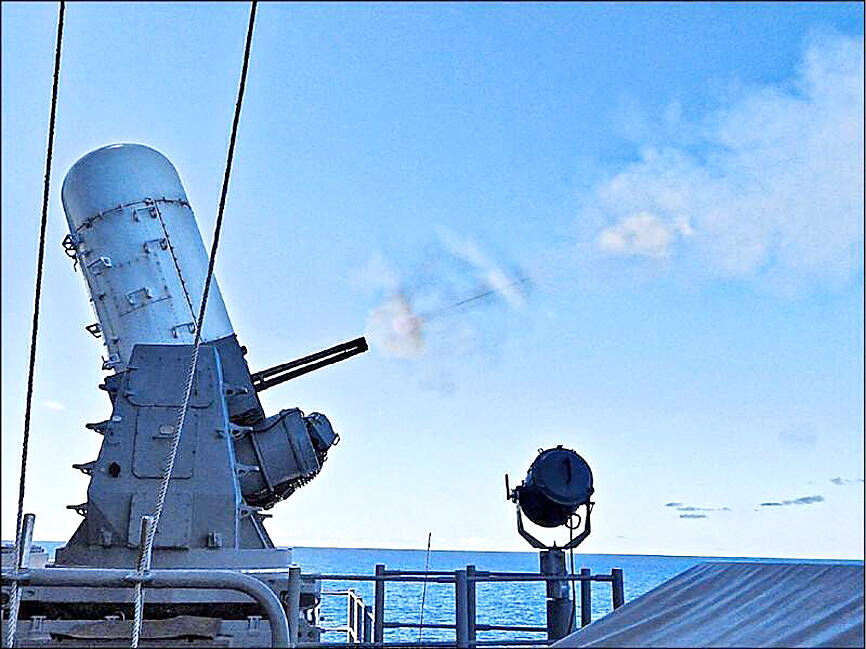The navy has installed 13 Phalanx Block 1B close-in weapons systems on its warships, increasing their defensive firepower, a defense official said on Saturday.
The systems cost the navy NT$10.16 billion (US$314.67 million), while eight additional Block 1A systems are being upgraded in the US and are expected to be delivered next year, the official said, speaking on condition of anonymity.
The Phalanx system used by Taiwan to defend its warships and key radar installations is a radar-cued gun system capable of firing 4,500 rounds a minute at targets as far away as 1.5km, the official said.

Photo: Screen grab from the navy’s Facebook page
With their superior range of engagement, rate of fire and a forward-looking infrared sensor, the Block 1B variant of the Phalanx system would boost navy ships’ defensive firepower against missiles, aircraft and small boats, he said.
The navy uses Phalanx systems to arm Keelung-class destroyers, Tuo Chiang-class frigates and Kang Ding-class frigates, among other warships that make up its fleet of principal surface combatants, he said.
The Yushan-class landing platform docks and the next-generation light frigates under construction would also be equipped with Phalanx systems, the official said.
Taiwanese warships typically have a point defense battery consisting of one or two Phalanx systems, he added.
The navy is to test the Sea Oryx Missile System, which was developed by the Chunghsan Institute of Science and Technology as a potential replacement for the Phalanx system, in live-fire exercises scheduled for later this month, he said.
The navy believes the US-made RIM-116 Rolling Airframe Missile or one of equivalent capability would be the best choice to use as point defense weapons on future warships, he added.

SECURITY: As China is ‘reshaping’ Hong Kong’s population, Taiwan must raise the eligibility threshold for applications from Hong Kongers, Chiu Chui-cheng said When Hong Kong and Macau citizens apply for residency in Taiwan, it would be under a new category that includes a “national security observation period,” Mainland Affairs Council (MAC) Minister Chiu Chui-cheng (邱垂正) said yesterday. President William Lai (賴清德) on March 13 announced 17 strategies to counter China’s aggression toward Taiwan, including incorporating national security considerations into the review process for residency applications from Hong Kong and Macau citizens. The situation in Hong Kong is constantly changing, Chiu said to media yesterday on the sidelines of the Taipei Technology Run hosted by the Taipei Neihu Technology Park Development Association. With

A US Marine Corps regiment equipped with Naval Strike Missiles (NSM) is set to participate in the upcoming Balikatan 25 exercise in the Luzon Strait, marking the system’s first-ever deployment in the Philippines. US and Philippine officials have separately confirmed that the Navy Marine Expeditionary Ship Interdiction System (NMESIS) — the mobile launch platform for the Naval Strike Missile — would take part in the joint exercise. The missiles are being deployed to “a strategic first island chain chokepoint” in the waters between Taiwan proper and the Philippines, US-based Naval News reported. “The Luzon Strait and Bashi Channel represent a critical access

‘FORM OF PROTEST’: The German Institute Taipei said it was ‘shocked’ to see Nazi symbolism used in connection with political aims as it condemned the incident Sung Chien-liang (宋建樑), who led efforts to recall Democratic Progressive Party (DPP) Legislator Lee Kun-cheng (李坤城), was released on bail of NT$80,000 yesterday amid an outcry over a Nazi armband he wore to questioning the night before. Sung arrived at the New Taipei City District Prosecutors’ Office for questioning in a recall petition forgery case on Tuesday night wearing a red armband bearing a swastika, carrying a copy of Adolf Hitler’s Mein Kampf and giving a Nazi salute. Sung left the building at 1:15am without the armband and apparently covering the book with a coat. This is a serious international scandal and Chinese

COUNTERINTELLIGENCE TRAINING: The ministry said 87.5 percent of the apprehended Chinese agents were reported by service members they tried to lure into becoming spies Taiwanese organized crime, illegal money lenders, temples and civic groups are complicit in Beijing’s infiltration of the armed forces, the Ministry of National Defense (MND) said in a report yesterday. Retired service members who had been turned to Beijing’s cause mainly relied on those channels to infiltrate the Taiwanese military, according to the report to be submitted to lawmakers ahead of tomorrow’s hearing on Chinese espionage in the military. Chinese intelligence typically used blackmail, Internet-based communications, bribery or debts to loan sharks to leverage active service personnel to do its bidding, it said. China’s main goals are to collect intelligence, and develop a